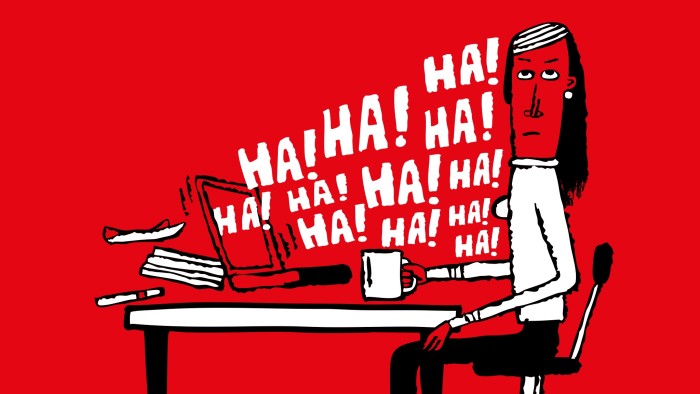Stay informed with free updates
Simply sign up to the Work & Careers myFT Digest — delivered directly to your inbox.
At one minute past seven o’clock last Tuesday morning, I received an email alerting me to the plight of “billionaires in distress”.
A new foundation had been launched to channel donations to embattled billionaires facing calls for taxes on the super-rich, a press release explained, or rather, tried to explain.
Lest any reader was dim enough not to spot that last Tuesday was April 1, and billionaires do not need donations, the release began with these words, in bright red: “Not a Press Release — Happy April Fools Day!”
Since the whole point of a Fool prank is to, you know, fool, I called 350.org, the climate campaign group behind the email, to ask why it had killed off any prospect of trickery from the get-go.
“There was concern from our legal department,” said a spokesperson. No one wanted the move to backfire in the US, where the Trump administration is gutting climate policies at a daunting pace. Also, the group did not want to inflame things in “an era of disinformation”.
Alas, poor April Fool, we knew you well. People have been predicting the death of this cheering custom for at least the past 10 years, first because the internet was going to usher in such a constant torrent of jokes that a single day of gags would become redundant. Then, because an onslaught of online scams and misinformation would make us wary of pranks.
The tradition survived, but this year, its days feel more numbered. 350.org was not the only organisation to succumb to an abundance of joke-maiming caution this week.
Bluesky’s announcement of a 299 character limit for posts might have been mildly funny to people who knew the existing limit was 300, until it added the words: “Happy April Fools’ Day!”
Nutella issued the same warning in case it upset anyone with its invitation to book a holiday at its new Nutella BnB rental home.
A US home decor company that unveiled a sofa fabric patterned with what looked like red wine stains “for the wine lover in your life” posted a short while later it was only joking.
All this makes you wonder if the companies need to rethink their decades-long effort to exploit the PR potential of April Fools.
The Taco Bell US food chain set off a storm when it took out full-page newspaper ads in April 1996 to announce it had bought the Liberty Bell to help cut the national debt and was renaming it the Taco Liberty Bell. The stunt provoked outrage across the nation. It made the network news. Even the White House joined in as Bill Clinton’s press secretary joked later in the day that the Lincoln Memorial would be refurbished by Ford and renamed the Lincoln Mercury Memorial.
But this was back in 1996, when printed newspapers sold in the millions and there was no such thing as Google, Facebook or an iPhone.
Trying to recreate a moment like that in today’s frantic media landscape makes little sense. Yet companies keep at it, despite signs of a backlash.
The UK is a bastion of April foolery, but still only 35 per cent of Britons in 2021 said they liked it when companies did April Fool’s jokes, while a larger 43 per cent said they did not.
To be fair to businesses, the country was still in the grip of the pandemic at that time and Covid-19 had upended attitudes to all manner of traditions. On April 1 2020, as the world rushed to lock down, YouGov pollsters found just 15 per cent of Britons thought April Fool’s Day should be encouraged that year.
YouGov failed to ask precisely the same question this year, but it did come up with a revealing insight when it asked how many people planned to play an April Fool’s joke on anyone this week. More than 60 per cent said they were “very unlikely” to do it. A mere 12 per cent said it was likely.
Some will say we should be grateful for even 12 per cent when the world faces a looming trade war at the hands of a US leader threatening to take control of Greenland and make Canada a 51st state.
I think it shows why April fooling keeps surviving, and why we need to take humour more seriously than ever before.
